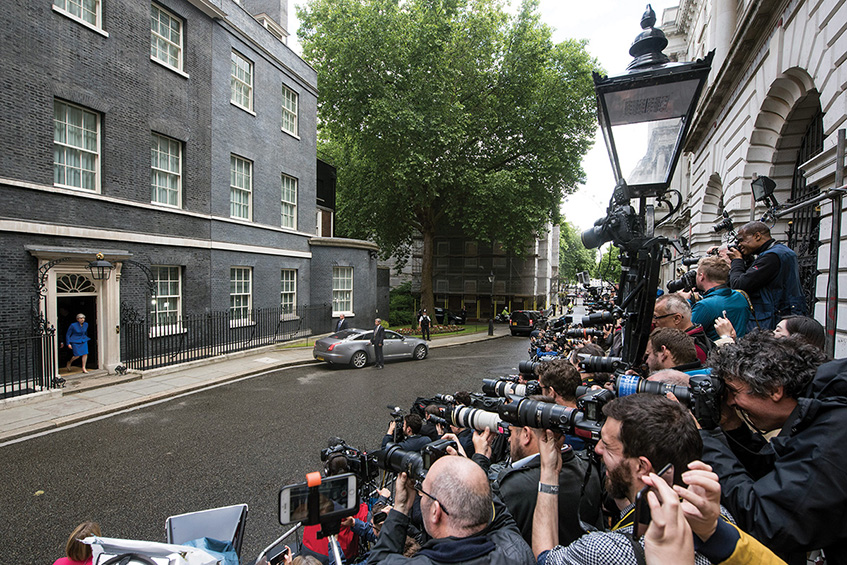Election 2017: what happens now?
The shock election result puts the NHS back in the thick of the political battleground. Anything could happen – but here’s ten things to look out for.

1. Simon Stevens has a stronger hand
Voters’ anger at perceived NHS cuts was a significant factor in a number of Conservative losses, most notably in Canterbury. So, preoccupied by Brexit and the possibility of another election, ministers may be inclined to let the NHS England chief get on with it. “The weakness of the minority government will strengthen the hand of NHS England in implementing the Five Year Forward View and continuing its work to achieve financial stability and improvements in performance,” says King’s Fund chief executive Chris Ham.
2. STPs will get harder
Unpopular reconfigurations of services may prove impossible to get through. Local opposition will be emboldened by the election result and Tory MPs sitting on small majorities will try to block them – and the government’s parliamentary weakness gives them the clout to do so. That said, if this leads to more engagement with local people, it could strengthen the plans in the long run.
The Tory manifesto was lukewarm on STPs, promising only to support those that were “clinically led and locally supported”. Jeremy Hunt’s job is to neutralise the NHS as an election issue, so some sort of review or delay seems likely, and Hunt may also want to get some sort of national grip on the whole STP process.
3. There might be (a bit) more money
One of the few numbers in the Tory manifesto was £8bn extra for the NHS over the next five years. They’re unlikely to go back on that. But it’s unclear how the money will be found – and it’s unlikely to come all at once. Expect the centre to continue bearing down on deficits using mechanisms like the capped expenditure process.
The Conservative manifesto promised “the most ambitious programme of investment in buildings and technology the NHS has ever seen”. Mystery still surrounds the funding for this, but the Government is likely to rely heavily on the £10bn-worth of asset sales identified by the Naylor review. They will have to tread carefully – a fire sale of NHS stuff to private property developers would not be a good look at the moment.
4. Forget about new laws
There won’t be time. With no majority, Brexit will consume even more parliamentary time than expected. Ministers are unlikely to find time for new health legislation, especially as it could simply hand the opposition a stick with which to beat the government.
The Conservative manifesto pledged new laws to remove impediments to the 5YFV, restrict the internal market, replace the Mental Health Act and rationalise the regulatory regime for doctors, nurses and other clinicians. They’re all probably off the agenda unless non-legislative solutions can be found.
5. Expect more tinkering
Unable to legislate, ministers and NHS England will rely on evolutionary changes. Expect more CCG mergers, and piecemeal and cautious progress on integrating and reconfiguring services. The government has promised some non-legislative moves to roll back the internal market, and accountable care organisations may get a boost – especially as the DUP is keen on them in Northern Ireland.
6. Get a tin hat and a thick skin
There was mercifully little manager-bashing during the 2017 campaign, but the NHS is right back in the middle of the political battleground and the temptation may be too much for some politicians. With little room for policy changes and little money to spend, old chestnuts about “more managers than nurses”, “fat cat NHS bosses” and “faceless bureaucrats” could make an unwelcome comeback.
7. Pay restraint may be relaxed
The government’s 1% cap on NHS pay rises was already under severe pressure, with unions, employers and just about everyone else calling for it to be scrapped. After the election, the prime minister’s new chief of staff, former housing minister Gavin Barwell, partly blamed his defeat in Croydon Central on the policy. Asking for pay restraint to go on for 10 years was “too much”, he said. Health secretary Jeremy Hunt also dropped a hint, saying he would “relay” concerns about NHS pay to Chancellor Phillip Hammond. Although the government defeated Labour’s attempt to end the pay cap in an amendment to the Queen’s Speech, there’s a good chance that Hammond will relax the cap in his autumn Budget.
8. A short-term fix for social care
Hammond will also come under severe pressure to find more money for England’s collapsing social care system. But after the “dementia tax” fiasco, a long term solution looks further away than ever. Finding a way to reform and fund social care is probably impossible without cross-party agreement, something to which the current febrile “pre-election” atmosphere at Westminster is hardly conducive.
9. A reprieve for EU staff
NHS leaders have been rattled by recent figures showing a 96% drop in applications to work in the UK by nurses from other EU countries. With the new parliament thought to be leaning towards a softer Brexit, an early deal that would allow EU staff already working in the NHS to remain indefinitely looks very possible.
10. More money for the NHS in Northern Ireland
The cheque’s already in the post. Theresa May’s deal with the DUP means an extra £1bn for Northern Ireland, and most commentators expect the DUP to come back for more sooner or later.
Craig Ryan is an independent writer and editor of Healthcare Manager.
Related News
-

Strange ways, here we come
Creating a ‘neighbourhood NHS’ will demand a different mindset, unfamiliar ways of working and difficult decisions on finances and staffing. Middle managers as well as senior leaders will play a big part in making it happen, writes Nigel Edwards.
-

Labour’s reforms: a mixed bag for managers
Ahead of the ten-year plan, Wes Streeting and NHS leaders have been sketching out some ideas for NHS reform. Jon Restell and Rhys McKenzie explain what these initial proposals could mean for managers.
-

Jon Restell’s Leading Edge | Giving managers legitimacy is the key to making reform work
The false trade off between the frontline and everybody else has become a deep-seated belief in a two-tier workforce. The health secretary needs to unite all NHS staff and give managers permission, encouragement and the tools they need to get his reforms off the ground.